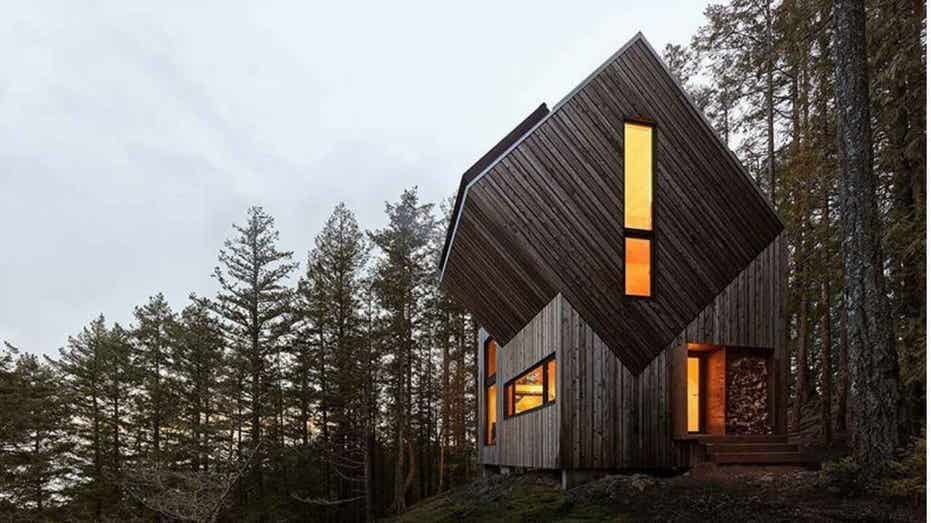The Ultimate Off-Grid Cabin Designed for Helicopter Installation on Remote Keats Island

A Stunning Off-Grid Retreat in the Heart of British Columbia
Perched atop the highest point of Keats Island in British Columbia, The Nest offers a breathtaking off-grid sanctuary that seamlessly blends eco-conscious living with innovative architecture. This retreat is a perfect example of how sustainable design can coexist with striking aesthetics, creating a unique haven surrounded by nature’s beauty.
Innovative Design by Daria Sheina Studio
Developed by the Vancouver-based Daria Sheina Studio, this prefabricated cabin resembles a modern sculpture nestled within a lush, moss-covered forest. Its sleek, minimalist lines might suggest a contemporary masterpiece, but don’t be deceived—The Nest operates entirely off the grid. Remarkably, it was installed in just two days, transported to its remote location via truck, barge, and helicopter, showcasing cutting-edge logistics and construction techniques.
Helicopter Installation: A Puzzle in Midair
Given the island’s rugged terrain and lack of road access, every construction step was meticulously planned. The prefabricated components, precisely manufactured for optimal weight and size, were delivered to the site and then airlifted by helicopter directly to the build location. This aerial installation transformed what could have been a logistical nightmare into a seamless assembly process, akin to completing a giant puzzle in midair.
Design Inspiration and Architectural Philosophy
The initial concept involved two rotated cuboid volumes, which at first seemed underdeveloped to the designer. However, her clients—Sean Sikorski and Chadd Andre—recognized the potential in this bold simplicity. Their enthusiasm sparked the realization of the distinctive interlocked geometric shapes, stacked and rotated like modern building blocks crafted from wood. This form became the defining feature of The Nest, embodying harmony between form and function.
Built for Rugged Terrain and Sustainable Living
Every aspect of The Nest’s design considers the challenging environment of Keats Island. Prefabricated in collaboration with BC Passive House standards, all components were built to exact specifications to facilitate swift and efficient assembly. Its foundation minimizes environmental disruption, reducing or eliminating the need for concrete, while the exterior—crafted from weathering Western red cedar—ages naturally to blend into the surrounding forest.
Inside the Cabin: A Minimalist Sanctuary
The interior spans three levels, featuring an open-plan ground floor that includes a living area, kitchen, and bathroom. Large sliding glass doors and exposed wood accents foster a deep connection with nature, offering sweeping views of the moss-covered trees and Howe Sound. The upper floors provide cozy bedrooms, designed for comfort and tranquility amid the wilderness.
Eco-Friendly Systems Powering the Retreat
- Solar panels generate sustainable energy for daily needs
- Rainwater harvesting and filtration systems ensure clean drinking water
- An incinerating toilet manages waste with minimal environmental impact
The design emphasizes eco-conscious living—reducing its footprint through innovative systems, natural materials, and thoughtful construction. The home’s exterior will weather gracefully over time, further integrating it into the landscape.
A Symbol of Shelter, Intimacy, and Connection
The name “The Nest” encapsulates the feeling of safety, warmth, and belonging that the design aims to evoke. Rather than sprawling, sprawling footprints, the layout emphasizes circular movement and a harmonious flow, fostering a sense of unity with the environment. Inside, expansive glass walls frame the lush greenery, making it feel as though the entire island is your private domain.
Redefining Off-Grid Luxury and Sustainability
This project demonstrates that remote living does not mean sacrificing comfort, beauty, or sustainability. With a compact footprint and low environmental impact, The Nest offers a luxurious escape that leaves a minimal ecological footprint. Its innovative use of prefabrication, smart logistics, and renewable systems paves the way for replicable models in other remote locations.
Living Better by Embracing Nature and Simplicity
The Nest exemplifies how thoughtful design can transform even the wildest settings into luxurious, sustainable retreats. It challenges the notion that off-grid living is about compromise, instead highlighting a lifestyle centered on intentionality, harmony with nature, and minimalist elegance.
Would You Choose Privacy and Nature Over Modern Convenience?
Would you trade the comforts of urban life for the serenity and seclusion offered by a remote cabin? Share your thoughts with us by reaching out through our contact page.




